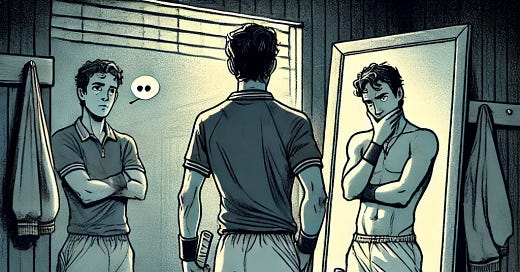Two tournaments, two unexpected exits. Carlos Alcaraz, tennis’s golden boy, was expected to glide through to finals of Indian Wells and Miami. Instead, he was outplayed by Jack Draper in the desert semi-final, then stunned by veteran David Goffin in his Miami opener—a player who had to qualify just to make the main draw. But what stood out wasn’t just the losses. It was the look: the absent smile, the tightened shoulders, and a cascade of unforced errors that seems to speak to something deeper. After Miami, Alcaraz admitted plainly that he didn’t feel well physically.
And that fatigue seems to be more than physical. Since his Wimbledon triumph last July, a subtle but persistent slump has crept in. A painful Olympic final loss to Djokovic, an early exit to Monfils in Cincinnati, and a shocking second-round loss at the US Open to van de Zandschulp—all point to a deeper toll. It recalls what David Foster Wallace once wrote—that in tennis, “the real opponent, the enfolding boundary, is the player himself.” The inner game is often the fiercest, especially when youth collides with the expectations of greatness. Alcaraz, for all his brilliance, might be brushing up against the boundaries of his own meteoric rise.
This is what happens when youth meets pressure at altitude. When the calendar doesn’t forgive and the spotlight, now desperate for a new king, never dims. Alcaraz is just 20, but he’s already been No. 1 in the world, won four Slams, and become the face of global campaigns. The joy that once defined him—the skip between points, the crackling grin—now looks laboured. He’s not in crisis, but he's at a crossroads.
And he's not alone. The pressures faced by prodigies like Alcaraz, Jannik Sinner, and now Joao Fonseca aren’t simply about winning matches—they’re about managing a life that’s sped up too quickly. Junior tennis is often sold as a proving ground, but it’s really a crucible. Every tournament is a test of focus, not just technique. Every success deepens the weight of expectation. Each breakthrough adds another layer of expectation. Sinner’s response? A monk-like discipline. No drama, minimal distractions, and a team built around stillness. Yet even he has admitted that for a long time, he was “surviving more than enjoying.”
What complicates the picture further is what what may be termed the perfectionism trap. As Alcaraz’s star has risen, so too have his inner demands. The pressure isn’t just external—from fans, media, sponsors—but internal, as he begins to expect flawless performances from himself. That constant mental grind can lead young athletes into difficult cycles of anxiety and self-criticism.
Mental resilience becomes more than a buzzword; it’s survival. Especially in a sport like tennis, where the global gaze is unrelenting and the margins between greatness and self-doubt are razor thin.
Fonseca, meanwhile, is just beginning to taste the swing of that pendulum. In Miami, he came through illness and a slow start to beat Learner Tien in a match that promises to paint the future. But now comes the harder part—doing it again, and again, and again. He’s still disarmingly candid in interviews (“girls? yeah, they’re a distraction,” he laughed), but behind that ease is a player being carefully moulded. His team just brought in Franco Davin, the man who helped guide Del Potro through the chaos of sudden success. It’s a move that signals intent—not just to win, but to grow wisely.
Which brings us to the quiet revolution happening in tennis: the rise of the sports psychologist. No longer a luxury, they are now core members of any elite team. Alcaraz works with Isabel Balaguer, and he has mentioned how critical she was for her first wins and for overcoming the Roland Garros semis cramp debacle against Djokovic in 2023. Sinner has a mental coach on call. These figures help athletes build the inner architecture required to hold steady amid the swirl of media, money, and ambition. The battle between different parts of self, or the Inner Game of Tennis, is why the game demands not just shot-making but self-mastery—especially when the noise outside gets louder than the voice within.
Tennis, at its root, is not just about how well you hit—but how well you hold. And for the new generation, the test is not talent. It’s how to keep growing while the world keeps speeding up. The question isn't whether they’ll face storms—but how they'll weather them when the joy goes quiet. For Alcaraz, and this emerging generation, holding on—when the joy dims—might be their greatest challenge yet.





Great read👏👏 right on point! I was just thinking about this after seeing the results this morning. It feels like with the Big 4 era winding down, more players believe they have a real shot. Alcaraz may have raced ahead with four Slams, but the confidence gap that once seemed vast is narrowing, and more players are stepping up with a real belief in their chances.
Veterans at the tail end of their careers are playing more freely than ever, and the players around him have watched and faced him enough to start getting a real feel for his game.
I despise the labeling that comes with all the expectations; it feels like being constantly touted as the next big thing or pressured to take over a legacy—Rafa’s, in his case—can be crushingly overwhelming. And like you said, “the global gaze is unrelenting”, hence, that internal battle will only intensify as the rest of the field continues to adapt. (along with the constant media pressure—something he can’t escape, only learn to tune out.)
That said, all in all, I’d like to believe Alcaraz will be just fine. He’s got a great team behind him and, hopefully, the strong head needed to weather it all. :)